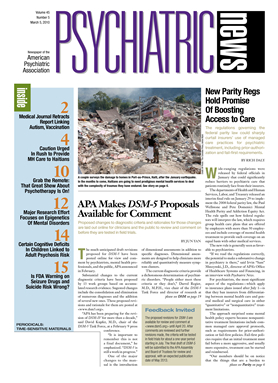APA members can “learn from the masters” at this year's annual meeting in New Orleans.
Debuting at this year's meeting are APA master courses, a chance for members to experience intensive, day-long courses with the very brightest lights in psychopharmacology, psychotherapy, cognitive-behavioral therapy, and neuropsychiatry. The price of each course includes four to seven hours of in-depth, interactive learning with a recognized “master” of the field, as well as a copy of a related textbook from American Psychiatric Publishing Inc.
“All of APA's annual meeting courses and symposia are excellent, but for members who want something extra, we are giving them the chance to really immerse themselves in a topic with an instructor who is at the very top of the field,” said Deborah Hales, M.D., director of APA's Division of Education. “The topics we are offering for master courses are not niche interests, but subjects that are vital to clinical practice.”
The five master courses are “Neuropsychiatry for Veterans,” presented by Stuart Yudofsky, M.D.; “Practical Cognitive-Behavior Therapy,” presented by Jesse Wright, M.D., Ph.D.; “Practical Psychodynamic Psychotherapy,” presented by Glen Gabbard, M.D.; “Cutting-Edge Psychopharmacology,” presented by APA President Alan Schatzberg, M.D., and Ira Glick, M.D.; and “Child and Adolescent Psychopharmacology,” presented by Christopher Kratchovil, M.D.
Each course will feature a panel of discussants, chosen for their prominence in the field. The courses run from 9 a.m. to 4 p.m. (except for “Neuropsychiatry for Veterans,” which is 8 a.m. to noon) and will include case vignettes for discussion and a lot of time for questions and answers.
“We want these courses to be interactive so members aren't simply listening to someone at a podium,” Hales said. “People who take these courses will really be involved and engaged throughout.”
The cost of each course is $320 for advance registration through April 10. On-site registration is $350.
Following are descriptions of the courses, dates and times they are offered, the names of the presenters and discussants, and the textbook that will be distributed at each course.
Saturday, May 22
9 a.m.-4 p.m.
Master Course 01: Child and Adolescent Psychopharmacology
Presented by Christopher Kratochvil, M.D., with John Walkup, M.D., Christopher McDougle, M.D., and Karen Dineen Wagner, M.D., Ph.D.
This course will provide practical information on the use of psychotropic medications in the treatment of children and adolescents. Faculty will provide an overview and discussion of recent data in pediatric psychopharmacology, with a focus on mood disorders, attention-deficit/hyperactivity disorder, anxiety disorders, and autism spectrum disorders. Management of adverse effects will be reviewed.
This course includes a copy of Clinical Manual of Child and Adolescent Psychopharmacology—a $62 value.
Master Course 02: Cutting-Edge Psychopharmacology
Presented by Alan Schatzberg, M.D., and Ira Glick, M.D., with Charles DeBattista, M.D., Terrence Ketter, M.D., Kiki Chang, M.D., and Natalie Rasgon, M.D.
An overview of cutting-edge issues in psychopharmacology every clinician needs to know to deliver high-quality care. Faculty will provide the latest clinical and research drug-development information with up-to-date advances applicable to clinical psychopharmacology and evidence-based practice. This course includes a copy of Manual of Clinical Psychopharmacology, Seventh Edition—a $92 value.
Sunday, May 23
9 a.m.-4 p.m.
Master Course 03: Practical Psychodynamic Psychotherapy
Director: Glen Gabbard, M.D., with Robert Michels, M.D., John Gunderson, M.D., and Gabrielle Hobday, M.D.
This course will enable participants to put basic psychodynamic principles to use in their practices and sharpen their skills. The course is designed to teach fundamental principles and techniques in dynamic psychotherapy, including managing resistance, when and how to use therapeutic interventions, transference and counter-transference, and flexible strategies for termination in psychodynamic psychotherapy. This course includes a copy of Long-Term Psychodynamic Psychotherapy: A Basic Text—a $54 value.
Master Course 04: Practical Cognitive-Behavioral Therapy
Director: Jesse Wright, M.D., Ph.D., with Judith Beck, Ph.D., Robert Goisman, M.D., and Donna Sudak, M.D.
Attendees will gain the knowledge and skills needed to provide cognitive-behavioral therapy (CBT) and will develop competence in this important therapy through lectures, learning exercises, role-play examples, and video vignettes. This course is designed to provide practical techniques for use in clinical practice. Attendees will receive a copy of Learning Cognitive-Behavior Therapy: An Illustrated Guide—a $64 value.
Wednesday, May 26
8 a.m.-Noon
Master Course 05: Neuropsychiatry for Veterans
Presented by Stuart Yudofsky, M.D., and Thomas Kosten, M.D., with Thomas Newton, M.D., Kimberly Arlinghaus, M.D., and Robin Hurly, M.D.
Veterans returning from Iraq and Afghanistan suffer high prevalence of alcoholism and substance use disorders, posttraumatic stress disorder, and traumatic brain injury. This half-day course will review the neurobiology underlying these conditions and apply this understanding to the diagnosis and biopsychosocial treatment of the most prevalent and disabling neuropsychiatric conditions in veterans.
This course includes a copy of
Essentials of Neuropsychiatry and Behavioral Neurosciences, Second Edition—a $114 value.

